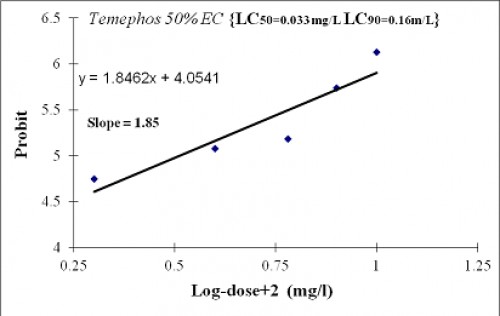Effect of basil (Ocimum basilicum) Leaves Powder and Ethanolic-Extract on the 3rd Larval Instar of Anopheles arabiensis (Patton, 1905) (Culicidae: Diptera)
Author(s): Hiba EMA Mahmoud, Nabil HH Bashir and Yousif OH Assad
Abstract: Malaria is transmitted by Anopheles arabiensis (Diptera: Culicidae), and the disease is a significant health problem in the Sudan, affecting 52% of outpatients and accounting for 9% of all hospital deaths. A cross-sectional study was conducted by collecting first to third instar larvae from Barakat area of Wad Medani town, Gezira State, Central Sudan. The third instar (L3) was used for the bioassay. Susceptibility to Basil (Ocimum basilicum), which is an abundant weed during the rainy-season, as a leaf powder, leaves ethanolic –extracts and the standard organophosphate larvicide temephos were investigated. Five concentrations (2, 4, 6, 8, 10 g/L) of the powder, and 1,2,…,5 mg/L of the extract were tested in a 1L beakers. Ten L3 larvae/beaker were exposed for 24 hr to each of these concentrations. Each concentration was replicated 3X, and the experiment was repeated twice for verification. The results showed that the extract LC50 was 58mg/L and LC90 was 143 mg/L; the slope of log-dose-probability line was 3.04. For the powder, the respective values were 9.19 g/L, 19.88 g/L and 3.82. The temephos resulted in 0.033 mg/L, 0.16 mg/L and 1.85, respectively. It can be concluded that using this natural, botanical extract and its leaf powder are effective, safe, economic and environmentally-sound in controlling the aquatic stages. It can be easily prepared and applied by villagers and others.
 Fig.:
Fig.: Dose-response of temephos on the third instar larvae of
A. arabiensis from Gezira state, Sudan
How to cite this article:
Hiba EMA Mahmoud, Nabil HH Bashir, Yousif OH Assad. Effect of basil (Ocimum basilicum) Leaves Powder and Ethanolic-Extract on the 3rd Larval Instar of Anopheles arabiensis (Patton, 1905) (Culicidae: Diptera). Int J Mosq Res 2017;4(2):52-56.



